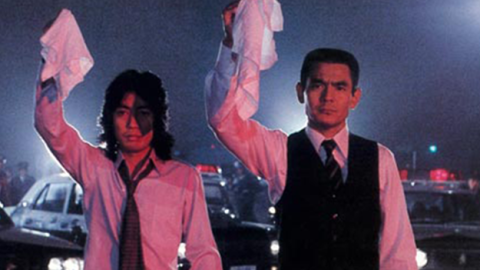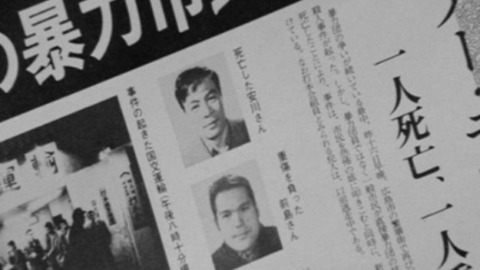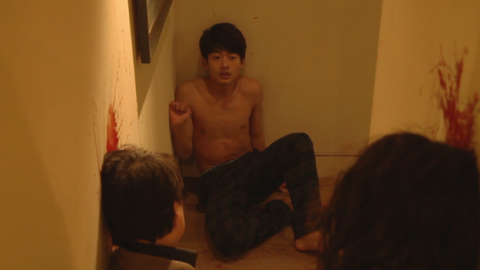Kaiju Shakedown: Korean Film on YouTube
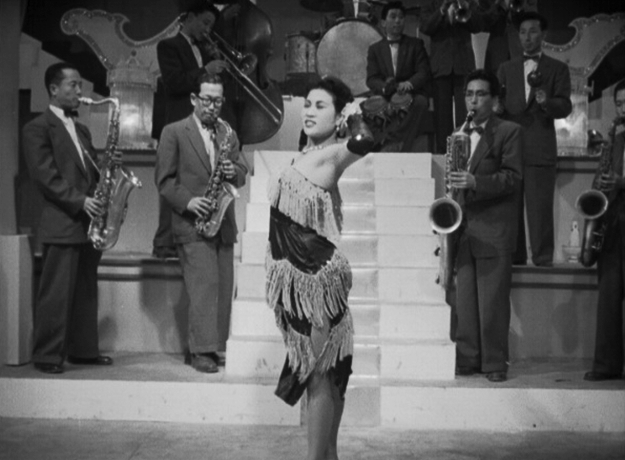
Madame Freedom
As Hulu is to rare Japanese movies, so YouTube is to Korean cinema. Thanks to the Korean Film Archive (KOFA), the most Type-A film archive in Asia is now also the most accessible, with 116 classic Korean movies streaming for free on YouTube in nice transfers with removable English subtitles. The only problem is figuring out what to watch.
KOFA has helpfully organized its channel into playlists like “Restored Films,” and “Seo Jeong-Min cinematographer (1934 – 2015),” but titles like “The Sensual Woman” don’t really help when you open it up to reveal a list of titles like Ticket (86), Declaration of Idiot (83), and Suddenly in Dark Night (81). I mean, you kind of want to know which of the three is the psychotronic, over-sexed horror movie about a giant wooden doll murdering a housewife with a meat cleaver. Darcy Paquet’s KoreanFilm.org has reviews of a lot of these movies, but there are so many highlights to hit, it’s hard to nail them all.
You’ve got national treasures like Im Kwon-Taek (eight movies), “the Steven Spielberg of Korea” Bae Chang-Ho (three movies), and the gonzo Kim Ki-Young (seven movies). Then there are landmark films like the super-depressing Obaltan (The Stray Bullet, 61), the shimmering Madame Freedom (56), and the revered My Mother and Her Guest (61). But let’s face it: you could care less about the classics. What you really want to know is which movie has the scene where the blind saxophone player goes full Daredevil and learns to catch arrows with his bare hands.
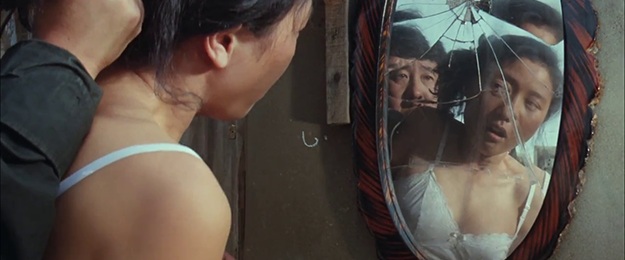
The People of Ko-Bang Neighborhood
If you want to try Bae Chang-Ho, his first movie is the best place to start. Save for the fact the lead is a kid, there isn’t much to call Spielbergian here. Instead, The People of Ko-Bang Neighborhood (82) is a sprawling, big-hearted movie based on a book by Lee Dong-Cheol, who picked Bae, then an inexperienced 29-year-old, to adapt his novel because he liked his passion. The movie almost didn’t get made because government censors didn’t want a film about poor people to come out of Korea: they rejected the screenplay numerous times, before approving it only if Bae made 60 changes, then they slapped the finished product with an export ban.
But then Korea’s poor didn’t want this movie to get made either. Shot in Gwangmyeong-dong, a rural area swallowed up by Seoul’s urban sprawl, the residents would frequently form mobs and chase Bae’s crew out during night shoots. The finished product is shot like a Robert Altman film, the camera drifting through the tight alleys and cramped interiors of an endless shantytown, finally focusing on Myeong-Suk—a single mother who’s raising Jun-Il, a kid whose main modes of expression are shoplifting, screaming, and running away. The man she’s shacked up with is slowly dragging her down, but that’s nothing compared to what happens when Jun-Il’s dad shows up after getting out of prison and promises to reform for the third time. Played by Korean screen icon Ahn Sung-Ki in full sexy glower mode, he’s saying all the right things, but Myeong-Suk has had enough of his endless cycle of broken promises, impulsive thefts, and lengthy incarcerations.
Full of tear-choked revelations and sob-filled confessions, People of Ko-Bang is 100 percent melodrama, but Bae insists on keeping his film grounded, swinging among Altman-esque observations of the wider shantytown community, then zooming in on the three-sided love triangle at its center. Studded with remarkable moments—like a sudden five-second flash-forward that encapsulates the entire arc of a love affair (Takeshi Kitano would use this same technique eight years later in Boiling Point)—it’s far from a standard-issue weepie, and the climax (an almost wordless laughing/crying fit between two women who’ve been hit hard by life) is followed by an absolutely horrifying ending that may have seemed romantic at the time but to modern audiences looks chillingly like another revolution in an endless cycle of abuse.
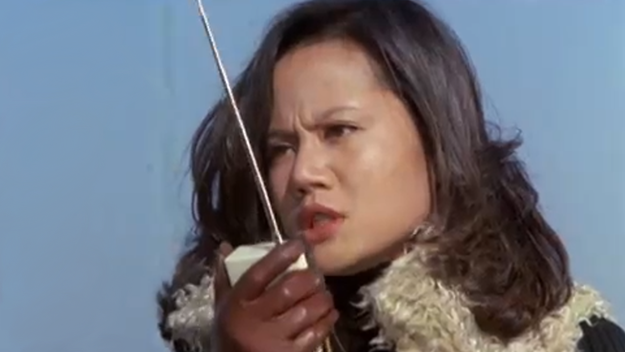
Devil! Take the Train to Hell
Speaking of abuse, brutalize your brain with Devil! Take the Train to Hell (77) a screaming, heebie-jeebie mash-up of melodramatic madness and action-movie pyrotechnics that begins with an explosion and a saxophone solo before introducing Park Dong-Hyuk (played by the film’s director, Park No-Shik), a middle-aged, blind saxophone player whose sparkly jacket conceals a heart burning for revenge. Eighteen years earlier, the Japanese murdered his father and shot Dong-Hyuk in the eyeballs. Now, he’s come to Japan to play lite jazz and kill Japanese war criminals with walnuts… and he’s all out of lite jazz. In the middle of one murder he meets Yeji (Ahn Bo-yeong), a girl from his hometown whose family was wiped out in the same rising sun-sponsored bloodbath. Afterward, she survived on raw rats while learning to control snakes with her mind and to spit needles with deadly accuracy. They’re so similar that not only do they team up, they fall in love.
Technically, Devil! Take the Train to Hell is enormously primitive and Park No-Shik has such a weak grasp of human behavior that his characters can’t even walk up the stairs realistically. The movie operates at peak hysteria at all times, alternating between Yeji and Dong-Hyuck weeping and blaming themselves for their woes, tearing out their hair and falling to their knees, before staging elaborate murders of evil Japanese who sit around their protected fortresses in fuzzy sweaters, cackling and eating bananas. One of Yeji’s revenge schemes hinges on the blind Dong-Hyuck driving a car, so she clearly has a sense of humor.
Never less than thrillingly tacky, Devil! is studded with some jaw-droppingly terrible action scenes, which makes Im Kwon-Taek’s The General’s Son (90) that much more of a surprise. The first film in a trilogy about the life of Kim Du-Han, a real-life gangster-turned-politician, The General’s Son became the highest-grossing Korean movie of 1990 and 1991. Hot-blooded and obvious, it’s a gangland epic in the style of Kinji Fukasaku’s Battles Without Honor and Humanity or any number of Big Timer movies from Hong Kong.
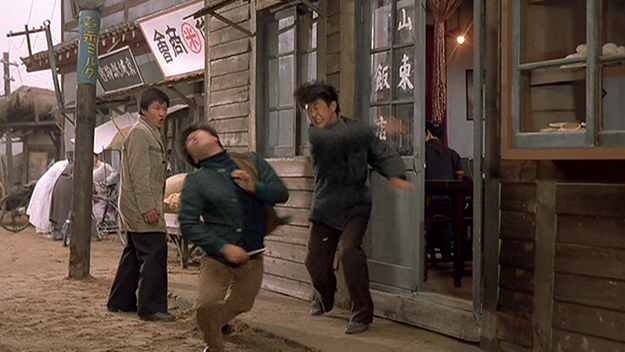
The General’s Son
Kim Du-Han (Park Sang-min) is a kid living on the streets of Japanese-occupied Korea. Some gangsters witness his knack for fancy fist-work, and he quickly rises through the ranks, settling scores with rival gangs in one-on-one duels with knives and fists. Byzantine gangster intrigue is rendered almost incomprehensible by the fact that every character has a Japanese and a Korean name, and they all sport identical wide-brimmed hats and trench coats that make them look like they’re up to no good. Full of constant whining appeals to Korean nationalism, it comes to electrifying life whenever a fight breaks out, which is about every 15 minutes. Director Im refuses to glamorize Kim Du-Han. He’s a great fighter but he can’t handle his liquor, he’s not very bright, and he’s a terrible pool player. But he fights like a dream. Thin as a whippet, he practically defies gravity, bouncing on the balls of his feet and smacking faces with the soles of his dress shoes. Fast and brutal, rather than elegant ballets, the beatdowns culminate in a final fight that is Tae Kwon Do heaven.
K-horror is represented on KOFA’s channel by Lee Man-Hee’s Diabolique adaptation, The Devil’s Stairway (64), a shimmering black and white thriller. Dripping with gothic atmosphere, it tells the clammy story of young Dr. Hyeon (played by Kim Jin-Kyu who, like many “young” leading men in classic Korean cinema, looks like a middle-aged office manager) carrying on an affair with Nurse Jin-Suk (the wildly popular Moon Jung-Suk). But when he gets a chance to marry the hospital administrator’s daughter, Dr. Hyeon doesn’t even pause before kicking Nurse Jin-Suk to the curb. She claims she’s pregnant, he demands that she get an abortion, she says no, so then he throws her down the stairs. This begins a cat-and-mouse game involving murder, resurrection, and terrible staircase maintenance, played out via several silent set pieces of elaborately staged accidents, disappearing corpses, and gloomy nighttime photography.
A bit creaky, but still fascinating to watch (and beautifully shot and edited), the real horror in this movie isn’t gravity, it’s a retrograde world where a doctor can backhand his wife in the middle of a crowded corridor, injuring her so badly that she requires surgery, and still be tapped to perform the surgery himself because, well, he’s a doctor. Despite being surprisingly frank about sex, pregnancy, and abortions, The Devil’s Stairway ain’t got nothing on Suddenly at Midnight (81), a movie that’s sexually frank to the point of panic.
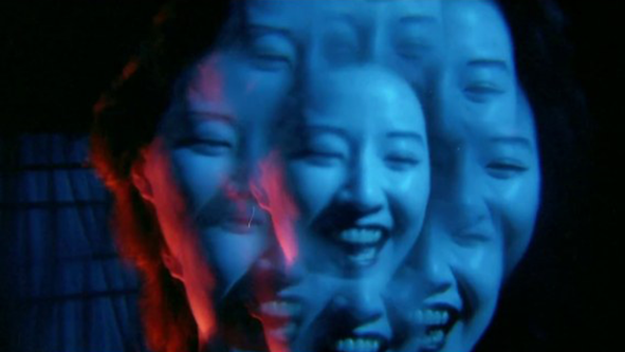
Suddenly at Midnight
Helmed by Korea’s most prolific director, Ko Young-Nam (108 films), Suddenly at Midnight is a horror movie from a man who shares Kim Ki-Young’s fascination with sexually predatory women and butterflies. Seon-Hee is comfortably married to Professor Kang, a butterfly collector. But nothing’s ever secure when you’re a woman. As her friend points out: “A 28-year-old woman is the same as a 60-year-old one.” Cue Prof Kang showing up with Mi-Ok in tow, a nubile teenager he found wandering around the charred ruins of her village home. “Why doesn’t she become our new housekeeper?” he suggests.
Mi-Ok seems like a harmless hillbilly until Seon-Hee takes her into the bathroom to hose off “all that dirt caked on you” and discovers that Mi-Ok possesses all those yards and yards of firm, young, succulent flesh that Seon-Hee fears she’s losing. Her sexual obsession with the teenager causes the movie to bust a gasket and dissolve into a dizzying series of nightmares and hallucinations scored to an electronic soundtrack that sounds like outtakes from a Goblin recording session. Add in the wooden doll of a shaman that Mi-Ok clings to—which seems to grow and shrink in size, depending on the occasion—and the stage is set for psychotic freak-outs galore. And boy howdy do we get them.
Working the kaleidoscope-lens and colored filters, director Ko turns the upper-middle class mansion into a simmering powder keg of sensuality and “accidentally-on-purpose” murder attempts as Seon-Hee slowly loses her mind. She’s up against the worst enemy possible: a sexy young girl with a baby-doll voice who thinks of the man of the house as her “daddy.” If you think all that the Korean Film Archive has to offer are old-fashioned classics, then please take a bite of this poisoned apple where the ultimate horror is an increasingly remote husband, an unhappy marriage, and a woman’s aging body. There’s nothing old fashioned about that—working women’s insecurities for horrific effect is truly timeless.
LINKS! LINKS! LINKS!
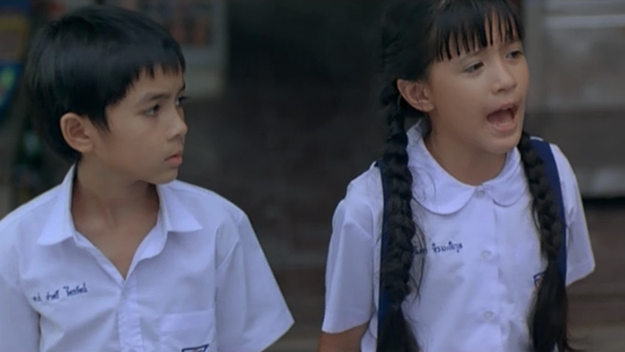
My Girl
…Stop the presses! November saw the unthinkable happen when Thailand’s most successful movie studio, GTH Hub, dissolved over an internal conflict about stocks. Formed off the back of their first big blockbuster hit, the feel-good romance My Girl (03), GTH Hub dabbled in the occasional horror movie, like Shutter (04, another huge hit), but mostly it was Mickey Mouse Club fare that made good: squeaky-clean comedies and romances starring a stable of squeaky-clean stars. Producing both TV and movies, the company was staggeringly successful until this November when it announced that, as of December 31, they are out of business. The reason? Some of the partners wanted to take the studio public, while others believed that kind of pressure wouldn’t be good for the movies. A statement posted on the company’s website (translated by Khaosod English, and posted via WiseKwai) reads in part:
“Every side has tried to initiate dialogue and negotiation to find a solution for a long time, but cannot reach a conclusion on the shared objective of the company . . . Therefore, we unanimously agree that if our works continue without finding a conclusion, it will cause damages to all sides involved.”
Read more over on Wisekwai, with links to even more coverage.
…Hong Kong’s Film Development Council isn’t just decrying a lack of risk-taking in Hong Kong’s film industry, and bemoaning how all the big productions are playing it safe, they’re actually doing something about it. A new grant has been announced that allows movies with a budget under HK$10 million ($1.2 million) to receive up to 20 percent of its budget from the FDC. This isn’t an investment, but a grant, and no return is expected. It’s being done to encourage independent filmmaking and bring some much-needed fresh blood to Hong Kong’s film scene.
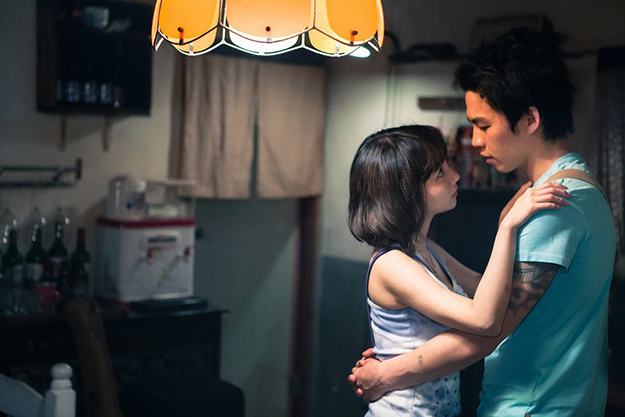
Thanatos, Drunk
…The Golden Horse Awards just wrapped up in Taiwan, and it’s no surprise that Taiwanese master director Hou Hsiao-hsien swept the major sparkle ponies. The Assassin won Best Feature Film, Best Director, Best Cinematography, Best Make-up & Costume Design, Best Sound Effects, and Hou got a special sparkle pony for “Outstanding Taiwanese Filmmaker.” A Taiwanese movie called Thanatos, Drunk took awards for Best Supporting Actress, Best New Performer, Best Original Music, and Best Editing, while a bunch of other movies shared what was left over. William Chang took Best Art Direction for Johnnie To’s Office, Hong Kong actress Karena Lam took Best Actress for Zinnia Flower, Mainland Chinese blockbuster director Feng Xiaogang took Best Actor for his turn as a retired gangster in Mr. Six, Jia Zhang-ke got Best Screenplay for Mountains May Depart, a Mainland movie called The Master got Best Action Choreography, Michael Ning received Best Supporting Actor for his part as the killer in Port of Call, and the latest McDull feature, McDull: Me & My Mum, took home Best Animation Feature.
…Actor Nick Cheung’s second directorial effort, Keeper of Darkness, about a butt-kicking exorcist, had the year’s biggest opening for a Chinese movie in Hong Kong. Despite his first movie not getting very good reviews at all, this flick has been pleasing everyone.
…It’s been 11 years since Shunji Iwai directed a movie in Japan, and the world is way past due for another one of his unclassifiable, unique, handcrafted masterpieces. And so, please welcome the teaser trailer for Iwai’s Rip Van Winkle’s Bride. All we know about the enigmatic film is that it’s about a young woman who starts working for an agency that provides people to pretend to be relatives at wedding receptions, among other odd jobs, after her marriage falls apart.
…Speaking of Japan, it’s a country whose entertainment industry is run by talent management companies that basically own actors like cattle and call all the shots. I’ve worked with a few in my time, and they will turn your hair white and slowly grind your soul into dust. They’re one of the big reasons that Japanese movies don’t have the international profile they should. Out of all the draconian management agencies in Japan, Yoshimoto Kogyo towers over the rest. The home of most of Japan’s top comedians (including Symbol and Big Man Japan director Hitoshi Matsumoto), they own performance venues, an amusement park, an FM radio station, and 650 artists. They signed a deal with CAA and Netflix recently, and they are also now linked to the Sumiyoshi-kai yakuza.
Apparently, 10 of their comedians were told to claim free massages at an orthopedic clinic on their health insurance, and then their claims were used to manufacture other fraudulent claims. Comedian Shiatsu Yaro was named as the recruiter of other Yoshimoto Kogyo–repped comics who received small payments in exchange for generating claims. Arrest warrants have been issued for all of the comedians, who claim they knew nothing about this scheme.




